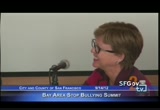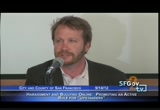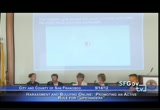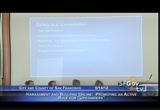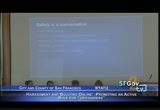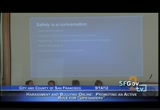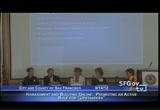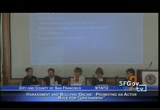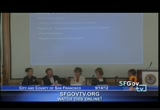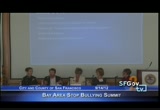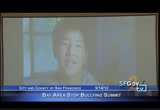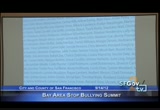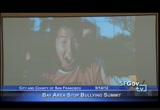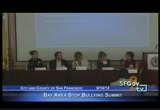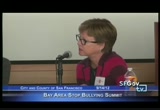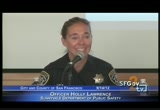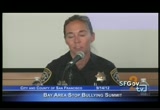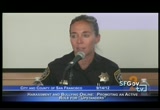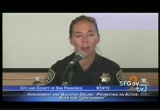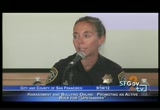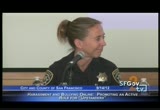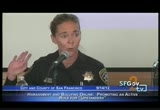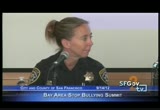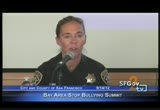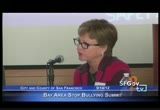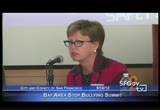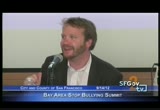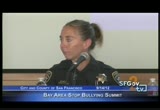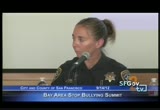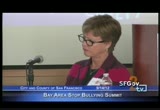tv [untitled] November 8, 2012 10:30pm-11:00pm PST
10:30 pm
social media. you're different. >> big, small. >> i don't know. >> big, bigger. >> yeah. >> she's tall. i'm short. >> let's not go there. >> the first thing i wanted to say this is an awesome day. i haven't seen this until now coming together of law enforcement, educators and industry and a variety of other folks and nonprofits organizations and really understand the issue and dive into it. it's been awesome and a ton of learning has gone into this. alice is amazing. everything that happened with time warner and got together a year ago and partnered up on this and wouldn't it be great if we got two major media organizations together, one traditional media which has a a lot of strength in eaching
10:31 pm
people via tv and one reaching people socially and if you could gather these together imagine what we can do? and so i think you called sizzle real. it was a sizzling experience to be in a high school in hare land and felt like a football pep rally but it was about bullying and they all took the pledge to stop it when they see it and amazing experience and tip of the hat to time warner to really understanding the issue and putting the weight of the media empire behind it to reach people, and second of all understanding how you sort -- there is the bully and there is the person being bullied but what if we got the 99% of other
10:32 pm
people inspired to take action? what kind of culture can we create? and that is the vant age point that facebook comes at it with. so i wanted to share -- >> [inaudible] >> no. there's a slide before this. okay. this is one slide. it says "we have 950 million people on the flat form. that's a lot of people. >> >> and for the most part people are good. sometimes people are not good. we have ways people r people can report content to us that is inappropriate, but we have since invested a lot of time and energy on things like social resolutions. how do you create a culture where people can report problems to each other? which i will talk about in a second, so cue up the next slide. >> dave, can i interrupt for a second? one of the things that i noticed they think is really important for people in the school space and probably law enforcement to remember is that
10:33 pm
social media platforms whatever it is and you name it -- what? a million apps for the mobile platform alone. those are not the context of bullying. school life, school, peer life, peer relations. that's the concept of bullying whether it's bullying or cyber bullying and this blame the new thing that's come along because we don't fully understand it because we kind of don't like it, or it's a waste of time for kids and all of those things are understandable and we blame what we don't understand, but kids love the media and it's time to start the understanding and understanding that these media are totally blended into their lives. it's not an alternate
10:34 pm
reality or something separate or add on that the school and the school context is what we're really talking about here and that is 90% of their waking hours. that's their social life. >> and one of the reasons that a lot of researchers and nonprofits don't like the term "cyber bull" and it's about the technology but not the behavior itself. we don't actually use the world cyber bullying. we talk about the behavior and there is tons of research we're doing in how people are behaving on our platform and the tools we can give them to resolve their issues and either through themselves and trusted audiences, et cetera, or turn to us and we don't use the term "cyber bullying" and we don't think about it's the technology. it's about the behavior itself and i know there is ongoing
10:35 pm
debate with that and cyber bullying captures people's attentions and everything i have learned from anne and the nonprofit community and the academic folks who have researched this when you use a term like "cyber bullying" you are diminishing the behavior and placing it on the technology. >> personally i hate it. it suggests robots and not humans at all. let's think about humanity, not technology. >> so i want to show you a couple of things and show you my version of a sizzle reel which is not sizzle and i am also mindful it's 4:00 o'clock on a friday so we are the last people between you and weekend, so let me say a couple of things. one is we built our platform with this thing called real name culture and people's actions are their identityity and we think when you do that people
10:36 pm
-- [inaudible] for the most part, people behave well because their actions are tied to themselves and their identity, and we've believed in this really firmly and it's the core of the kid's safety effort which is the thing that i worked on. that doesn't mean that everybody is good, and everybody behavesl but if we feel like real identity or real name identity is one of the things that causes people to behave nicely and we actually have seen data that when you take facebook and you take comments and import it to other sielts because it's facebook the amount of trooling go down and the amount of real and authentic comments go up and it's awesome and where we start from. the second thing i was going to point out we have a way that anybody and everybody can report
10:37 pm
contents that they find harassing on any page, and they can come right to us, but we've invented this thing, which is not the most brilliant invention but working well and the social resolution way to solve bullying and other harassing content, so we created a flow where you could say "hey, i don't like that piece of content" and instead of reporting to facebook ink and we have 3,000 people but we don't understand the context of everything going on. you can report to a family or friend or somebody off the site. >> in the context -- >> in the context of the behavior itself. we have seen the reports go down. the closing of the reports go up and when we surveyed the people both the person reported and the person reporting -- not
10:38 pm
everyone, but most of the people were very satisfied how it resolved itself. now just think about that. somebody said -- so it's like i say to anne "anne nice shirt. nice jacket. >> but you hate it. >> and i hate it or maybe i don't. i'm giving a complement. the thing is facebook inc. doesn't know the context but now we have a system in place and i can resolve to anne and anne could say "i didn't mean to post that photo in an inappropriate way. i'm going to take it down" and we survey the people and everyone feels good about the situation and traditionally we thought it was a case of bullying and two people -- >> misunderstanding. >> there was a misunderstanding so i wanted to point that out and we have this new social
10:39 pm
resolution thing and a great way to solve problems at a scale of hundreds of millions of people and it's quite awesome to see that unfold, and the last thing i was going to point out in my version of sizzle reel everything we're trying do is create a culture where people speak up for each other and there's a story that i'm going to show you that i think sort of like epitomizes this how do you use social media and the power of friends to create a culture where people stand up for each other? cue up my sizzle reel. >> the varsity soccer team lost every game by embarrassing margins. our goal keeper quit. he was take criticism and playing as a freshman and variousity goal keeper. we
10:40 pm
thought we were on the ifert first game that wouldn't be a loss and their star player and couldn't stop it and back of the net and the ref is blowing the whistle. >> it's horrible because the goalie -- one mistake is a goal and the goal in soccer is huge. this guy said "i'm going to make a great photo. we have photos of you making saves" and the photos went up and i was shocked. it was just horrible. after those photos were posted there was a lot of tension and i didn't want to go to school. i felt like taking time off. i didn't want that attention. i
10:41 pm
didn't want that negativity. >> we decided we had to do something and eventually we found this great picture of him making a save and the three or four of us at 7:00 p.m. made it the profile picture and about an hour later and it exploded and starting with the soccer team making it the profile pictures and the girls did and the whole school got involved. 100 people liked it, commented on it, tagged them in and made it their profile and the entire site was covered with it. he came to school the next day like he was 10 feet tall. once he had that confidence he was throwing himself out like a rag doll. one game hammering shot and shot and shot and he makes the best
10:42 pm
save i have ever seen. he was parallel to the ground and did a superman dive and 10 seconds later the ref blew the whistle and we won. >> i started running and people were chasing me and wow best moment of my life. i changed from the freshman kid to danielle quie, the best goal keeper. >> the whole school stood up for someone who needed it. >> he was a normal kid just like us. we have our highs and lows and that's when we realize that we were all danielle quie. [applause] >> nice job. that is more normative than bullying. that -- i mean that pink shirt day
10:43 pm
in canada. two upper classroom in nova scotia and a kid was teased and aggressively treated because of a pink shirt and they wore pink shirts and everyone in the school wore a pink shirt and once a year kids wore pink shirts to school and kids started a group in iowa and nobody knows the identity and started twitter and tweeted to show the support for the person treated badly on twitter. that is more normative and if we share that information with our kids then they will respond in kind. they will be encouraged. >> and i will leave you with that thought. i think anne got it right and if i leave you with that thought that alice is doing is broadcasting this idea of
10:44 pm
you speak up when you see bullying occur, and what we're doing is taking the power of our platform that reaches almost a billion people what you all with us need to do is come up with programs that enable that to happen. this is the most inspiring thing i have seen and we need to replicate that in every high school around the world. >> i don't know if adults can do it. i think we have to create the space. we have to give them space to do it themselves somehow. i don't know. maybe it's a school climate thing. it's a conversation that we need to have. moving on to officer holly lawrence. her work is so inspiring to me. i read a story in texas and expulsions and suspensions are a direct pipeline to the juvenile
10:45 pm
justice system and the punitive approach doesn't fix anything. i can happily point you to that study and makes cases against that school discipline, but holly has come up with a really wonderful solution within law enforcement that we would love you to talk about and it's preventive and solution. >> thank you. it's not going to be a shock to you that i don't have a sizzle reel but i did manage to get a few powerpoint slides in so it's a good thing if i can get my next one. can you advance it for me please? so it is a safety course that i created with yahoo. we partnered together. i started asking questions the first day so my boots are on the ground and i'm in the schools and i love doing what i do, and i believe wholeheartedly and i
10:46 pm
believe it was the soft power -- yes, i love it. i think it's effective in so many ways, so i had luckily teamed up with the right people at yahoo who were really amazing and just the foresight they saw, and believed in the concept that law enforcement needs to be a piece of this puzzle and have some solutions. we have a unique part in the schools and with kids and this did get certified for the peace officer standards and we get credit for that being police officers and our training and our curriculum -- i have a slide. hopefully -- it started as a diversion program for the restorative justice and sort of a piece of the pie, almost
10:47 pm
geared towards probation and after a kid was in trouble for some violation i asked what happens to these kids? what programs are out there for them? when i am dealing with kids in possession of naked pictures of other kids. what are they going to do when i cite them? i didn't have answers or ones i didn't think were a comfortable fit when kids had these problems and started with kids after they were already in trouble and grew out of that because there was so much need in the school on the prevention side too, so it really is -- if i can get to the next one, the next slide. so yeah it's a proactive and reactive approach so it started on the reactive side. i think law enforcement is good at reacting to things so started with a program with the at risk kids that were already
10:48 pm
violators and grew to a prevention tool in the schools that law enforcement can present and oftentimes there are great nonprofits that have amazing programs but for a law enforcement officer in uniform to present it and not serious enough but my kids are going to get that i worked at cartoon network today. that's serious. that's what my kids are hearing about tonight, but law enforcement has a serious tone so we created this program for officers to present to schools and to pta's and to faith based organizations and any community group that wants to hear it. we have the hour long safety program and started with digital safety as the kind of umbrella but it touches on -- i agree i don't like the term cyber bullying. kids don't use that and it's bullying and it's drama. everything is drama now
10:49 pm
but law enforcement needs to look at the piece of social media and what it plays and taking the phone is like cutting off the arm and parents are not understanding the disconnect and it's a divide and how kids communicate today and how parents communicate and helping parents parent in this digital world and helping kids make smarter decisions, so they don't have to worry about friending the college recruiter and them taking,a way their scholarship or anything like that. it's also looking at trainings for law enforcement officers -- when i go to a school and has a knife and on the honor role and never had any problems so it would be easy -- well let's cite you for possession for the knife and you will get suspended and have consequences and on the way, and you start asking questions and what is going on? what is
10:50 pm
behind this? i am being threatened and i was are withed about my safety and there is a bullying issue and i brought a knife to school because i am scared what is going to happen on the way home, so you have to look past just what is going on with the initial "what do you have?" and dig deeper, and it's just some tools and some help, but law enforcement can be involved with. >> and that's what we're hearing too with facebook when things come up in facebook for example or instagram or twitter and the tip of the iceberg. what you see is not what you get. it might actually be somebody victimized retaliating or against or reacting to something that happened off line or at school. do you have examples
10:51 pm
of how bullyings and targets can change hats? >> with that example he went from a prerp prerp traitor to a item in the same conversation. we get the uncomfortable nobody wants to deal with situations. i know that nobody wants to look at a kids having naked pictures of other kids and it's something that elephant in the room. i don't want that. that doesn't happen at my school. i didn't see their phone. i didn't see any of that, but you need to take hold of that and own it and get that out there and make the difference and change the behavior and make it serious and when law enforcement -- we don't have a lot of laws in place. i say all the time "it's not illegal to be mean to each other" and i tell that to adults and i can't tell you
10:52 pm
government officials "i have free speech. i can say what i want" and they have good arguments. i will give them that but you need to show them -- and law enforcement needs to show them it's not okay and we take it seriously and i do counseling for issues that originate at school and social media, whatever it is but as part the solution and we are standing up together and saying it's not okay. >> and holly this is no longer a local program, correct? >> it's amazing the response and law enforcement and everybody is looking for tools and answers to get some solutions and so we took it to washington dc earlier in the summer, so we have been working with maryland and virginia and all over california and hopefully washington soon and really excited to get
10:53 pm
everybody interested with the information. >> somebody asked how do you implement a restorative justice program? do you have that answer. >> that's a good question and it's definitely county specific in california they noticed because i have done training in this program in different counties and i always invite the local da and the probation department and there are nuisances in every state and county and everyone wants to help. no one says no. they ask what they need to do to get on board and everybody is making it work and ways of it fitting in their system. >> there are a number of definitions of restorative justice i noticed and going to bullying prevention conversations in the country. some of them areis bad on native american tribal practices and i remember one teacher of
10:54 pm
restorative justice that did training in a lot of schools and talking about how there was a child who had offended another child. i guess some kind of social aggression problem and they created a circle of justice where each party brings, both the victim and the offender bring in people close to them and the offender was asked "okay who do you want to bring in with you" and he was a foster child just new to his latest set of foster parents and didn't know them very well and wasn't comfortable with bringing them in. didn't really know or trust anybody and that is another thing. i think we need to define trust for kids. they're not sure what that means and finally lee and i can get you information about his program. i can't remember his last name
10:55 pm
now. he finally asked the child is there any adult at school that knows your name? and he said "yeah the janitor". only the janitor knew his name and we called the janitor and asked will you sit with the child in the center? and he said yesterday. absolutely. he loved that boy and there was real resolution as a result of that circle of restorative justice. there are amazing programs to look into if your school is interested. we have six minutes -- if that, right bosss? so if anybody has any questions for these amazing people in si verse group of fields the floor is open to you. >> [inaudible]
10:56 pm
>> did you just search right now. >> [inaudible] >> i didn't say this -- do not share it widely because you can't yet. >> you can eventually. >> i wanted to give everyone a sneak peak. we're going to launch the video in october so this was just for your eyes only. that camera over there -- do not broadcast that or else my friends back at facebook will be really mad at me, but on october 1 we will launch it and i will make sure that you get it. i think it's a great video and i want everyone to see it. >> (inaudible). >> thanks for bringing that up. i forgot to put the disclaimer on that it's for your eyes only. >> [inaudible] >> question over here? >> a little bit of a question, a little bit of a comment -- well, more of a comment. first i
10:57 pm
want to say that i am excited that law enforcements and nonprofits and da's are in the room. a lot of conversations sound promises to the future. one of the concerns i had coming in and not to take away from bullying as the target of the conversation but one of the concerns is discipline of individuals and bringing up the restorative justice model earlier and in california and the country and vast disparities from people suspended and expelled from schools and african-american base and a teenos and often expelled or suspended for things that would typically not merit that type of reaction from administration and authorities at the very least, so in the last panel and this panel i was thinking about social and emotional learning and i see that as a double entand ra. i
10:58 pm
think it's also a negative thing and this is why. there is a lot of social and emotional learning going on in these schools and especially around the group of individuals suspended and expelled at alarming rates and things of lesser things and goes back to messaging. what type of messaging situations are we imparting on these kids that get suspended for a couple of days and feel guilty or don't have the opportunity to express themselves and for the social emotional training they didn't receive up to that point? and don't know how to deal with it and get in trouble for reacting the way the culture decides is non conforming so i say that to say this and i like the
10:59 pm
comments and i don't find myself often agreeing with district attorneys but i like the last comments and i would regurgitate some of the comments for us to think about going forward and not necessarily having an agenda but what we all want, so they went something like this in terms of what we can do. i don't like it when people are taken advantage of. social justice -- getting education is a social justice issue. we don't want kids to feel they can't go to school or go home. we want other's worth intact and appreciate the worth. justice is a public face of love and 60% of kids who are discipline read likely to drop out of school, so if we attach the same concerns that we have for all of the students and comparing with the evidence base data that suggests there are a la
118 Views
IN COLLECTIONS
SFGTV2: San Francisco Government Television Television Archive
Television Archive  Television Archive News Search Service
Television Archive News Search Service 
Uploaded by TV Archive on

 Live Music Archive
Live Music Archive Librivox Free Audio
Librivox Free Audio Metropolitan Museum
Metropolitan Museum Cleveland Museum of Art
Cleveland Museum of Art Internet Arcade
Internet Arcade Console Living Room
Console Living Room Books to Borrow
Books to Borrow Open Library
Open Library TV News
TV News Understanding 9/11
Understanding 9/11